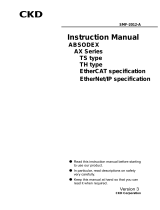
2
Terms and Definitions
2. Terms and Definitions
Term Explanation and Definition
PDO communications
(Communications using
Process Data Objects)
PDO communications is used for constant data exchange
between a master and slaves.
PDO data (i.e., I/O data that is mapped to PDOs) that is
allocated in advance is input and output each EtherCAT
process data communications cycle (i.e., the task period of
primary periodic task).
The NJ/NX-series Machine Automation Controller uses PDO
communications for commands to refresh I/O data in a fixed
control period, including I/O data for slave units and the position
control data for servomotors.
It is accessed from NJ/NX-series Machine Automation
Controller in the following ways.
・With device variables for EtherCAT slave I/O
・With axis variables for a servo drive and an encoder input
slave to which an axis is assigned
SDO communications
(Communications using
Service Data Objects)
SDO communications is used to read and write specified slave
data from a master when required.
The NJ/NX-series Machine Automation Controller uses SDO
communications for commands to read and write data, such as
for parameter transfers, at specified times.
The NJ/NX-series Machine Automation Controller can
read/write the specified slave data (parameters and error
information, etc.) with the EC_CoESDORead (Read CoE SDO)
instruction or the EC_CoESDOWrite (Write CoE SDO)
instruction.
Slave unit There are various types of slaves such as servo drives that
handle position data and I/O terminals that handle bit signals.
A slave unit receives output data sent from a master, and sends
input data to a master.
Node address A node address is an address to identify a unit connected to
EtherCAT.
ESI file
(EtherCAT Slave Information
file)
An ESI file contains information unique to EtherCAT slave units
in XML format. You can load an ESI file into the Sysmac Studio,
to allocate EtherCAT slave process data and make other
settings.





























